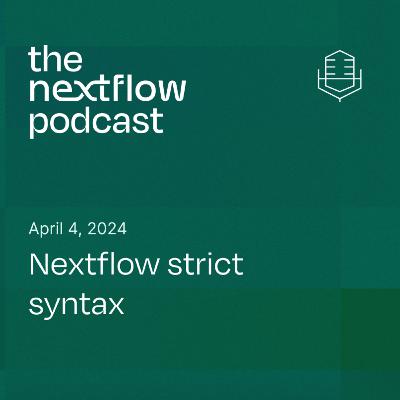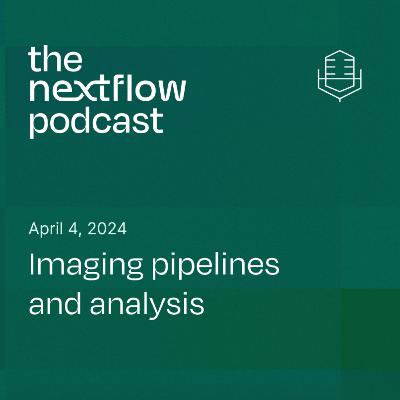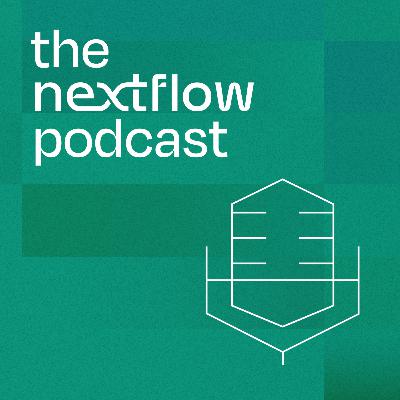Discover The Nextflow Podcast
The Nextflow Podcast

The Nextflow Podcast
Author: Seqera
Subscribed: 20Played: 263Subscribe
Share
© Seqera
Description
Nextflow is the leading workflow orchestrator for bioinformaticians, data scientists, and professionals in computational biology and genetics. Stay informed with the latest updates, expert interviews, and insights from the Nextflow ecosystem with The Nextflow Podcast, by Seqera. Follow us on Twitter @nextflowio and YouTube @Nextflow.
53 Episodes
Reverse
In Episode 52 of the Nextflow podcast, Phil Ewels is joined by Ziad Al Bkhetan and Steven Manos from the Australian BioCommons to explore how Nextflow and Seqera Platform are transforming bioinformatics research across Australia.Discover how the Australian BioCommons emerged as a national infrastructure investment to support molecular life sciences researchers, building digital platforms and tools that serve diverse research communities - from genome assembly to proteomics. Learn about their journey from identifying Nextflow as the leading workflow management system in Australia to successfully deploying Seqera Platform for over 90 users across 18+ research institutions.The conversation covers fascinating success stories including the collaborative development of the nf-core/proteinfold pipeline, supporting structural biology researchers with advanced protein folding tools, and the innovative Ozark community phylogenetic trees workflow. Steven and Ziad share insights on overcoming challenges like integrating web platforms with traditional HPC infrastructure at Australia's tier-one supercomputing facilities (NCI and Pawsey), and building hybrid compute environments that seamlessly span local HPC and cloud resources.Key highlights include Australia's growing contribution to the global nf-core community, culminating in their first official participation in the March 2025 nf-core hackathon with a dedicated Sydney hub. The team also discusses practical advice for other countries looking to establish national Nextflow services, emphasizing the importance of building local expertise and community engagement.For Australian researchers interested in accessing these services, visit biocommons.org.au to learn more about available platforms, training opportunities, and community resources.00:00 Podcast Ep 52: BioCommons00:06 Welcome00:41 Ziad - introduction01:36 Steven - introduction03:40 Introduction to Australian BioCommons08:13 Nextflow usage in Australia09:05 BioCommons collaboration with Seqera12:24 Compute infrastructures in Australia15:05 Nextflow support & training16:43 Highlights and lowlights19:11 Protein fold21:50 Ozard Community23:39 Automation with Seqera Platform25:52 Nextflow Communty in Australia29:27 2025 nf-core hackathon31:57 Future plans for Nextflow & Seqera Platform33:04 Tips for building a National Nextflow platform36:21 Next steps37:51 Wrap upResources:Australian BioCommons: https://biocommons.org.aunf-core office hours: https://nf-co.re/blog/2025/apac-helpdesk-2025
In Episode 51 of the Nextflow podcast, Phil Ewels and Ben Sherman discuss Nextflow's upcoming strict syntax - a significant evolution bringing clearer error messages and a more consistent language framework. They explore key changes including the separation of code from declarations, removal of for/while loops in favour of operators, and changes to type annotations. Learn how these improvements lay the groundwork for better developer experiences with features like static type checking and auto-formatting. The episode covers migration timelines, practical steps to prepare, and how these changes will ultimately lead to more robust, maintainable pipeline code. Check out the Nextflow docs for the "Updating Nextflow Syntax" guide to start preparing today.00:00 Podcast Ep51: Strict Syntax00:07 Welcome and introduction01:20 Language server background04:18 Syntax sugar is just empty calories06:50 Bespoke language syntax08:20 To DSL3 or not 2 DSL10:59 Nextflow versioning15:13 Diving into specifics16:08 Mixing statements with script declarations19:19 Better inspect command21:08 Custom Classes23:32 For loops, while and switch26:02 Standard library26:56 Type annotations28:49 addParams32:26 Process script section34:20 Moving into lib/36:36 Configuration syntax41:14 Relieving pressure from the config43:38 Timelines44:55 The gain for the pain47:54 Next steps48:43 Conclusion
In this milestone 50th episode of the Nextflow podcast, host Phil Ewels sits down with Krešimir Beštak, a PhD student and active contributor to the nf-core community, to explore an exciting frontier in bioinformatics: microscopy and spatial omics.While Nextflow is traditionally associated with genomics workflows, Krešimir shares how it’s being used to power image analysis pipelines like MCMICRO, supporting complex research into cardiovascular disease and cancer diagnostics. Based at the University Hospital Heidelberg, Krešimir discusses his transition from master’s student to PhD researcher, the translational applications of spatial proteomics, and how Nextflow enables reproducible workflows far beyond its original scope.00:00 Podcast Ep 50: Krešimir00:09 Welcome and introductions03:13 Introduction to Spatial Omics04:26 Multiplexing markers06:38 Metabolite microscopy07:23 Myocardial multiomics08:58 Microscopy data analysis11:32 nf-core/mcmicro13:05 2D vs 3D microscopy13:38 Computational bottlenecks within analysis15:43 Other nf-core imaging pipelines18:36 Downstream analysis after molkart19:53 Manual interventions23:27 Minerva25:39 Google Maps for cells27:16 Microscopy community around Nextflow30:34 How to get involved31:38 Changes in Nextflow for microscopy32:43 Nextflow Ambassador program33:17 Conclusion
Join host Phil Ewels in Episode 49 of the Nextflow Podcast as he interviews Dr. Olga Botvinnik, founder and CEO of Seanome. Olga discusses her journey from studying at MIT to founding her non-profit research institute focused on marine genomics. Discover her groundbreaking work in annotating unknown proteins and her efforts in collaborating with the Earth BioGenome Project.Olga also shares her experience with the Nextflow and nf-core communities, and her vision for developing tools to aid research in understudied ocean organisms.Join us as we chat about the vast potential of marine genomics and its applications.00:00 Podcast Episode 49: Olga Botvinnik / Seanome00:06 Welcome01:18 Olga's background07:30 Colonial tunicates09:38 Starting Seanome with Arctic clams11:07 Vision for Seanome12:46 Earth BioGenome Project13:46 Animal genomics not metagenomics14:53 Building nf-core/proteinannotator19:46 Software engineering in bioinformatics22:21 nf-core early days27:46 Bioinformatics Beyoncé30:50 Seanome future steps32:10 Final thoughts: Why the ocean34:19 Goodbyes
In this episode of the Nextflow Podcast, we dive into highlights from the recent Nextflow Summit held in Barcelona in 2024. The summit featured an incredible range of talks, demonstrations, and discussions showcasing the latest advancements in workflows, data analysis, and community collaboration.
With so much exciting content to explore, we’ve picked out some of our favourite moments to share with you. From impactful new features to inspiring keynote addresses and humorous presentations, this episode offers a curated selection of clips that capture the energy and innovation from the event.
Join us as we relive the summit’s best bits and discuss their significance for the Nextflow community.
00:00 Start
00:10 Podcast introduction
00:47 Introductions: Group 1
01:56 Clip 1: Wave mirroring
04:32 Clip 2: Throwing cat food
06:00 Clip 3: crisprseq
08:03 Clip 4: nf-test
10:34 Clip 5: Workflow output definition
12:39 Clip 6: Open Science Software Foundation launch
15:08 Clip 7: FAIR code with nf-core
16:58 Clip 8: Teaching with Nextflow
18:56 Clip 9: Conda lock files
21:24 Clip 10: MultiQC in scripts
22:43 Clip 11: Small Nextflow Big Nextflow
25:17 Introduction: Team 2
26:11 Clip 12: Genomics England
29:47 Clip 13: Alphafold interactive reports
33:26 Clip 14: Data Studios
35:32 Clip 15: Covid and Ebola
37:35 Clip 16: Seqera AI
41:34 Clip 17: Nextflow VSCode DAGs
44:33 Clip 18: Fusion snapshots
48:38 Clip 19: Sustainable computing
52:38 Clip 20: nf-core/tools
56:37 Clip 21: Industry best practices with nf-core
58:58 Clip 22: Federated data queries
01:01:56 Clip 23: Nextflow Ambassadors
01:05:04 Conclusion
In episode 47 of The Nextflow Podcast, Phil Ewels and Ben Sherman discuss the launch of the new Nextflow language server, a significant upgrade providing advanced code intelligence features such as code completion and error hints for VS Code users.
They detail the benefits of formalizing Nextflow as its own programming language, reducing reliance on Groovy, and improving error messages and code clarity. They also cover new documentation, plans for future features like type annotations, and encourage community feedback and adoption.
Find the new docs here: https://www.nextflow.io/docs/latest/vscode.html
00:00 Podcast Ep 47 - Version 2 - VSCode Extension
00:09 Welcome and introductions
00:44 Podcast rebranding
01:29 Nextflow Summit announcements
02:48 Language server background
06:27 Nextflow as a programming language
09:58 Building a language server
14:12 VS Code interactions with the language server
15:22 VS Code demo
15:50 Errors + warnings tray
17:10 Errors: Level 0
20:00 Errors: Level 1
22:32 Errors: Level 2
23:02 To def or not to def
24:46 Variable references
25:34 Number of arguments
25:57 Hover hints on workflows and processes
26:19 Code navigation
26:52 Output hints
27:17 Code peeks
27:56 Getting help
28:29 Code formatting
30:25 Nextflow schema params
32:03 Future warnings
34:02 Preview DAG
34:54 Fixing new syntax errors
35:42 Config files
37:07 Updating the plugin
37:33 Roadmap: Type checking
38:55 Conclusion
In this episode of Channels, the Nextflow podcast, host Geraldine from Seqera and her colleague Ben Sherman dive into the differences and similarities between Nextflow and the Workflow Description Language (WDL). They discuss the origins and development of WDL at the Broad Institute, the challenges of working with different workflow languages, and how Nextflow's channel-based data flow model compares to WDL's approach. The conversation covers key features, type systems, and runtime specifications, highlighting the strengths and limitations of both languages. Ben hints at upcoming improvements and enhancements for Nextflow, aimed at making the language more robust and user-friendly. The episode offers valuable insights for bioinformaticians and developers navigating the complexities of workflow management.
In this episode of Channels, the Nextflow podcast, join us as we explore Nextflow and AI. Our special guest, Sasha from Seqera, shares his remarkable journey from the consumer tech industry to bioinformatics. Learn about the birth of TinyBio, its innovations in bioinformatics AI applications, and its recent acquisition by Seqera. We delve into AI concepts, the challenges faced, and the future of integrating AI with Nextflow. Tune in to discover how advancements in AI are reshaping the bioinformatics landscape.
00:00 Podcast 45: Tinybio : Nextflow x AI
00:09 Introduction
00:34 Sasha's background
03:17 How tinybio started
05:57 Tinybio co-founder: Vishal Patel
06:35 tinybio chat public launch
09:20 Failed feature launches
10:39 Running the code too
12:46 User trust
14:11 Accessing files via chat
15:08 Experiment idea generator
17:16 Pipeline generator
20:25 AI concepts: Foundational models
22:36 AI concepts: RAG
24:53 AI concepts: Langchain
26:37 AI concepts: Fine tuning
29:14 Challenges in bioinformatics AI
31:53 AI concepts: Q&A training
33:09 Motivation for joining Seqera
34:43 What happens to tinybio now?
35:36 Future plans
38:20 AI and open-source
40:50 Find more updates
41:37 Wrap up
In episode 44 of the Nextflow Channels podcast, Phil Ewels welcomes Alex Pelzer— a key figure in the Nextflow and nf-core community. Alex shares his journey from academia to the pharmaceutical industry, highlighting the critical role of regulatory frameworks in bioinformatics.
🌟 Key Highlights:
The transition from working at QBiC to Boehringer Ingelheim.
The importance of maintaining high-quality, reproducible pipelines in bioinformatics.
Understanding regulatory requirements and their impact on clinical trials.
How regulatory standards and open-source initiatives like @nf-core are shaping the future of bioinformatics.
Alex also discusses the formation of the @nf-core Regulatory Special Interest Group, which aims to bring together experts in the field to establish and promote best practices for ensuring pipeline quality and compliance with regulatory standards.
Looking forward to seeing many of you at the upcoming #NextflowSummit in Barcelona this October! We’ll be working with this #regulatory group during the nf-core hackathon.
00:00 Episode 44: Regulatory revolution
00:06 Introductions
00:33 Upcoming Nextflow Summit Announcement
01:34 Alex’s Background and Early Days with Nextflow
04:41 Formation and Growth of nf-core
06:18 Transition to Pharma and Regulatory Work
08:56 Regulatory Challenges and Practices in Bioinformatics
13:30 Tool Selection and Quality Assurance
15:23 Evaluating Software Trustworthiness
17:08 Overhead in Academia vs. Industry
18:11 Downstream analysis
20:57 Regulatory Special Interest Group
25:28 Special Interest Groups in nf-core
28:59 Future Directions and Community Involvement
30:15 Open source contributions in pharma
33:27 Conclusion and Upcoming Events
In this episode we explore the new features of Seqera's Data Studios and Data Explorer, with Phil Ewels, Rob Newman and Rob Syme from Seqera.
Discover how to use these tools for troubleshooting Nextflow pipelines, tertiary analysis and Nextflow development. We discuss the pain points that led to the creation of Data Studios and how it's designed to allow scientists to interactively and collaboratively work with data and complex workflows, without having to move large datasets around.
Rob Syme wows us with another fantastic practical demonstration, setting up and using Data Studios to write and test a Nextflow pipeline in VSCode running on the cloud in a Data Studio environment, including running the Nextflow CLI with task submission to AWS Batch.
We cover features like session persistence to save work states, and upcoming custom container support for your own specialized applications.
Learn how these tools can enhance your computational biology projects and make seamless cloud integration a reality.
00:00 Channels Podcast 43: Data Studios
00:26 Introductions
01:54 Data Studios
04:51 Move the compute to the data
06:13 Real-time collaboration
06:47 Data Explorer
09:41 Access to public data
10:45 Data Explorer demo
13:56 Data Studios setup
20:17 Session persistance
22:52 Data Studios RStudio demo
28:24 Nextflow development in Data Studios
36:17 Future development
37:01 Custom containers
40:01 Boston Summit demo
44:01 Lifetime management
47:14 Wrap up
A small but intrepid team of Seqerans recently attended the ISMB 2024 conference in Montreal, a great mix of computational biology and bioinformatics with a largely academic / research-focused audience. Join Geraldine Van der Auwera, Rob Syme and Florian Wuennemann for a lively discussion about the scientific themes of the conference, their experience running the booth, meeting with the ISMB and BOSC community, and resources for job seekers.
Join us in exploring the latest Nextflow release, 24.04. Phil Ewels and Ben Sherman dive deep into the new updates in Nextflow’s most recent version. We discuss advanced retry strategies, job arrays, resourceLimits, Singularity’s OCI mode, and the game-changing Workflow Output Definition.
We’re actively seeking feedback from the community on these new features. We would love for you to experiment with the new syntax and let us know your thoughts.
Please let us know what you think either via Nextflow GitHub issues or via the community forum.
In this episode we refer to a the recent blog post about the release, which you can find here: Nextflow 24.04 - Release highlights.
Intro - tweaks, fixes and new support in 24.04
Performance and Stability Improvements
Ben kicks off the discussion with key performance and stability improvements. The latest stable release, 24.04, includes numerous bug fixes and performance enhancements. There’s a significant focus on closing gaps and adding retry strategies for better stability, especially concerning cloud providers. Notably, if Nextflow’s API calls against cloud providers fail for any server-side reason, it will retry automatically, avoiding pipeline failures caused by temporary server issues.
Publishing Changes
Previously, if a file failed to publish, Nextflow would only issue a warning. It was possible for a pipeline to complete successfully without noticing missing output files. Now, by default, Nextflow will fail the pipeline if the publishing fails, though there’s an option to revert to the old behavior. Additionally, retry strategies for publishing have been introduced to ensure retry attempts if an issue arises.
Job Arrays
One highly requested feature is the introduction of job arrays. This allows users to submit many jobs as a single submission, alleviating strain on schedulers. The submission happens in a batch, and then the scheduler can process and plan effectively. Once a job is submitted as part of a job array, the jobs run independently. If any child job fails, it is resubmitted without affecting the rest of the array.
Singularity OCI mode and GA4GH TES
In the past, Singularity supported Docker images by converting them into SIF files, consuming storage and time. Now, both Singularity and Apptainer can run OCI images directly, saving valuable resources.
Additionally, the TES executor has seen significant improvements, now supporting TES 1.1, which brings broader compatibility and integration with existing workflows.
Major new syntax features
Topic Channels
A new feature called topic channels offers a more straightforward approach to collecting channel outputs across pipelines. Channels can emit data to a named topic, simplifying the collection and use of version information from various processes within Nextflow pipelines.
Eval Outputs
Eval outputs simplify the addition of shell commands to tasks. With eval outputs, necessary post-task commands can be defined neatly, avoiding repetitive code within process definitions.
Workflow Output Definition
The concept of workflow output definitions has been introduced. This new syntax streamlines the publication of files by defining publish targets within workflows. Instead of defining publication behaviors within process definitions, users can now manage them at the workflow level, ensuring better clarity and fewer repetitions in the code.
Join us to hear Phil Ewels chat with Maxime Garcia
and Franziska Bonath about how nf-core started at the
National Genomics Infrastructure (NGI) at SciLifeLab in Sweden.We chat about how the nf-core/sarek pipeline grew alongside and eventually joined nf-core,as well as the early days of nf-core bytesize talks and outreach organisation.
Links:
- SciLifeLab
- National Genomics Infrastructure
- Maxime's Nextflow Summit Boston 2023 presentation about Sarek
- nf-core bytesize talks
Tune in to hear all about Pixelgen Technologies - creators of a novel technology
for doing single-cell spatial proteomics.
We chat about how this fascinating technology works, what you can do with the data
and why they chose to develop their analysis suite as an open-source nf-core pipeline.
Links:
Software:
nf-core/pixelator pipeline
Pixelator Python package
Science:
Nature Methods publication: “Molecular pixelation: spatial proteomics of single cells by sequencing”
Presentations:
Nextflow Summit 2022 talk: “Pixelgen Technologies ❤︎ Nextflow”
Nextflow Summit 2024 Boston talk: “Nextflow allows Pixelgen innovation engine to reach the market quicker”
Nextflow Summit 2024 Barcelona
Pixelgen:
Pixelgen Technologies homepage
@PixelgenTech on twitter / X and LinkedIn
BioLizard:
BioLizard homepage
@BioLizard_nv on twitter / X and LinkedIn
Chapters:
Start (00:00)
Welcome (00:09)
Introductions (00:50)
Intro to Pixelgen Technologies (01:41)
Lab methods (03:08)
Nature Methods publication (06:15)
Data visualisation (09:35)
Working with single cell data (12:29)
Cell interactions (15:06)
Why Pixelgen chose open source (16:05)
Pixelator Python package (20:10)
Building within nf-core (21:40)
Florian - Biolizard (23:01)
Pipeline overview (25:19)
Using nf-core from a commercial setting (26:50)
Coming out of stealth (28:53)
Extending Pixelator (32:24)
Dealing with customers (34:58)
Looking to the future (39:38)
Interactive analysis (41:32)
Advice for others (43:12)
Pixelgen at the Nextflow Summit (45:16)
Evan Floden (CEO and co-founder of Seqera) joins Phil Ewels (Product Manager for OSS at Seqera) to talk about two of the big announcements at the recent Nextflow Summit Boston 2024 - Seqera Pipelines and Seqera Containers.
We dive into what these two new community offerings are, why we built them and how they work.
Links:
https://seqera.io/pipelines/
https://seqera.io/containers/
Announcement blog post
Nextflow Summit Boston 2024 agenda
Summit YouTube playlist
Nextflow 24.04 blog post
Timeline:
00:00 - Introduction
00:37 - Nextflow Summit Boston 2024
01:14 - Summit talks available online
01:57 - Summit announcements
04:32 - Seqera Pipelines - motivations
05:59 - Seqera Pipelines - first look
06:48 - Testing requirements for community pipelines
10:05 - How we tested pipelines
11:53 - SRA-Explorer tangent
12:34 - Seqera Pipelines - live demo
16:14 - Getting Nextflow launch commands
19:12 - Seqera Containers - intro
24:03 - Seqera Containers - live demo
27:13 - Containers - ARM cpu arch builds
28:33 - Singularity containers
29:09 - Wave CLI
31:19 - Nextflow with Seqera Containers
33:22 - Seqera Containers - future usage
35:09 - Where to read more
36:53 - Thank you to the community
Join us as we discuss the brand new @nf-core / EuroFaang pre-print! 🔥 We chat to some of the key authors, covering the background to the paper, the main messages and how EuroFAANG and nf-core have collaborated. 🧬 👩🏻🔬
Join us in this episode of the Channels podcast for a closer look at the Nextflow Ambassadors Program. Marcel Ribeiro-Dantas and Geraldine Van der Auwera discuss the origins of the program, recent highlights and next steps, including the open call for new Ambassadors, which will close June 14.
Relevant links:
Call for applications: https://www.nextflow.io/ambassadors.html
Original announcement: https://www.nextflow.io/blog/2023/introducing-nextflow-ambassador-program.html
Marcel’s favorite Ambassador-contributed Nextflow blog post: https://www.nextflow.io/blog/2024/reflections-on-nextflow-mentorship.html
This podcast episode is quite different to normal. Rather than an interview or a discussion, you'll get to watch as Ben Sherman guides Phil Ewels through the process of creating a new Nextflow Plugin from scratch. Right from the first line of code to creating a release and publishing the plugin.
Nextflow plugins have been getting more attention lately and we've been getting a lot of questions in the community. There is better documentation and resources planned, but in the mean time we hope that this can be a useful guide for anyone curious in how they work, and interested in getting started.
After this we will be back to our usual routine in the podcast, but we'd love to hear what you thought of this taster!
00:00:00 Welcome
00:03:27 Nextflow docs
00:08:34 Starting by forking nf-hello
00:10:32 Overview of project files
00:17:13 Trying a first compile
00:18:12 Different publishing methods
00:19:54 nf-boost local publish method
00:23:05 Trying the new compile
00:24:00 Running locally with the plugin
00:27:32 Looking at the nf-hello plugin code
00:39:29 Deleting files we don't need
00:42:34 Finding event names in the Nextflow source
00:47:46 Writing some custom functions
00:49:41 Testing our new code
00:51:51 Modifying the test pipeline to create files
00:54:14 Coding up the JSON output
00:59:20 Looking at nf-prov code for BCO files
01:05:30 Testing JSON output
01:09:39 Automatic work dir cleanup / nf-boost
01:12:17 Publishing a release on GitHub
01:19:07 Custom plugin repositories
01:26:47 Publishing for all Nextflow users
01:29:52 Conclusion and end
In this episode of Channels, we talk to Jakob Zeitler - Head of R&D at Matterhorn Studios.
We dive into how they use Nextflow and Seqera Platform for material science research, paving the way for cheaper and more eco-friendly products for the future ⚗️👩🏻🔬🔬🌎
It may not be bioinformatics, but there's a lot that's in common!
In this episode of the podcast, Geraldine and Ben talk about the Global Alliance for Genomics and Health (GA4GH) and its efforts to develop interoperability standards for pipelining infrastructure.
If the words TES, WES, TRS and DRS are just as much alphabet soup to you, tune in to learn all about how organizations around the world are collaborating to streamline the process of sharing and analyzing data at scale.








